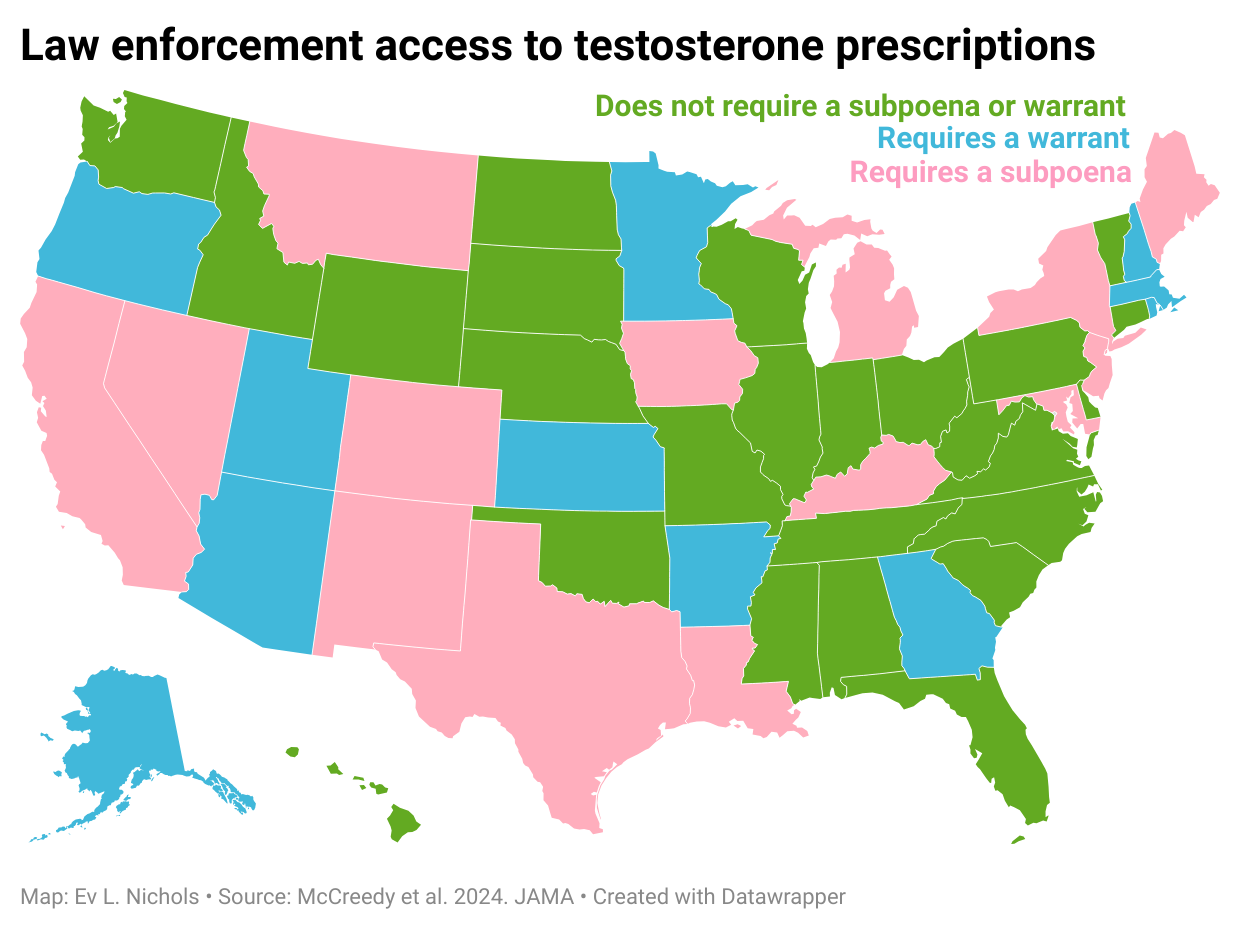The cops may know about your testosterone prescription
a new JAMA study analyzed state level polices around prescription drug monitoring programs
United States law enforcement agencies often have unfettered access to testosterone prescriptions, according to a new (and paywalled) study published in JAMA this week. The work examined the state-by-state regulations of prescription drug monitoring programs (PDMPs) which register the prescription of controlled substances, including the gender affirming hormone testosterone.
The Drug Enforcement Administration (DEA) determines which substances have the potential for abuse using a five-tiered scheduling system. The federal agency classifies testosterone as a Schedule III substance, defined as having “a moderate to low potential for physical and psychological dependence.” This designation is due to testosterone’s abuse as a performance enhancing agent for athletes. As such, estradiol is not a classified substance. Due to DEA scheduling, people seeking testosterone for legitimate medical reasons (such as gender affirmation) face additional hurdles to attaining a prescription.
Since testosterone is a scheduled substance, state PDMPs track every testosterone prescription. While the data collected by PDMPs is not public, law enforcement agencies are able to access it according to regulations set in individual states. As seen in the map above, access requirements vary state-by-state with no clear partisan trend.
Some states require law enforcement to obtain a warrant or subpoena before given access to the data, ensuring that the judicial system must agree to the disclosure. However, 24 states simply share prescription information with law enforcement on demand. Critically, among this group are states that have aggressively targeted trans people in recent years, including Florida, Oklahoma, and Tennessee. Further, 42 states permit sharing PDMP data across state lines.
The sharing of medical information with law enforcement has been a central role for PDMPs since their inception in 1939. During the 1990’s, states expanded their use of PDMPs as a surveillance tool to respond to the overprescription of opioid painkillers. In these cases, the data was in the hands of public health specialists who successfully used their access to target community rehabilitation programs.
In 2013, the State of Oregon and four anonymous patients (including one trans man on T) sued the DEA to prevent access to PDMP records. The patient John Does, with support from the ACLU, cited concerns about their medical privacy as protected under the 14th Amendment. However the Ninth Circuit Court of Appeals rejected the claim and upheld the DEA’s access to prescription records.
In recent years, states have been increasing their surveillance of trans people, and PDMPs represent a possible area of expansion of these efforts. In states with bans on gender affirming care for youth, PDMP data can become criminal evidence.
While prescriptions for estradiol are not tracked by PDMPs, Genspect (an anti-LGBTQ hate group according to the SPLC) has proposed hormone PDMPs explicitly for surveillance purposes. They suggest doing so by monitoring electronic health records for any gender affirming hormone prescription. No state has yet adopted this model, but the group is lobbying officials on anti-trans policies both in various states and abroad.
how do we fix this
There is a very simple solution to this problem for those with a testosterone prescription: The DEA and Food and Drug Administration (FDA) deschedule testosterone. In fact, two years ago Massachusetts Senators Ed Markey and Elizabeth Warren asked the Biden administration to deschedule testosterone, specifically to ease access for transmascs. However, testosterone reminds a schedule substance.
Testosterone prescriptions are only collected by PDMPs because of its federal scheduling. As federal agencies, the DEA and FDA fall under the purview of the president, meaning that this issue is yet another whose immediate future will be determined by next week’s election.
Descheduling testosterone is necessary, but a simple change does not address the larger issue of law enforcement’s easy access to prescriptions of scheduled drugs. Why is the bar so low for police to view personal medical records? The Controlled Substances Act. To address this broader privacy issue, Congress could amend the law and set national standards to eliminate police access to this data - or at least curtail the relative ease that law enforcement agencies currently benefit from.
Doctors aren't trained in queer health. But you can help!
If you are a queer person, you probably have had at least one bad experience with the medical system. Maybe a doctor asked you invasive questions about your sexuality or sexual practices. Or, they misgendered you (even after you shared your pronouns). Perhaps they didn’t know what you were talking about when you asked a…







There can be some additional hurdles because of the rules around testosterone. I'm required to show legal identification every time I purchase it, and especially earlier in my transition there were frequent awkward moments at the pharmacy around this. Sometimes I was asked if it was for me or someone else. Many times I was asked what it was for. Occasionally I was asked if I wanted to have a preferred name on file since my name is gender ambiguous. Depending on the person behind the counter I would sometimes watch my ID disappear for a long time into an office with no windows. It was likely infuriating to them that my ID says "X" for the gender marker. And I'm in a super liberal location, nothing like Florida or Texas.
Someone else that I follow was talking about issues with hormone therapy, and I found myself wondering... (Maybe I shouldn't even ask, because I bet it's very illegal, but...) I'm a cisgender man who happens to know my testosterone levels are borderline low. What would be the feasibility of getting my doctor to put me on T and giving it to some transmasc person who didn't have access? Would that even make sense medically?